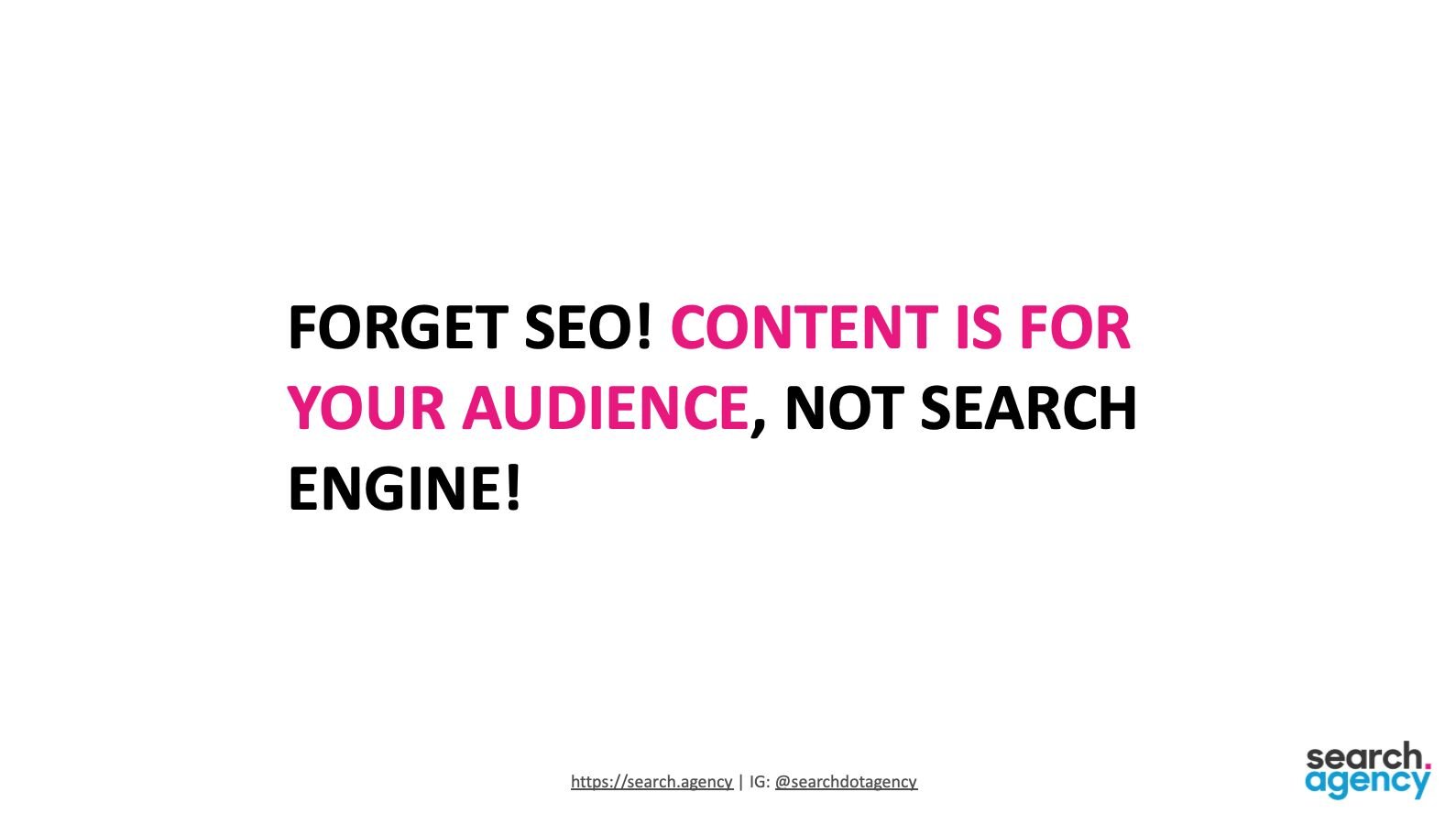Why You Should Prioritize Your Audience Over SEO in Content Creation
I always kick off the SEO Fighter Bootcamp content marketing class with a familiar slide.
I sincerely believe in it: Stop focusing solely on SEO when creating content. Instead, spend more time crafting content your audience will enjoy.
In today's blog, I want to emphasize why content creation should center around your audience rather than obsessing over SEO metrics. Let's break down why this approach is more rewarding and effective in the long run.
SEO Is Just a Delivery Tool
The role of SEO (Search Engine Optimization) in content creation is essential, but it's not the ultimate goal. SEO ensures that your website efficiently delivers the content you've worked hard to create to your audience. It helps with navigation, page rendering, HTML structure, page experience, and technical directives that make your website functional. But once the content is out there, it truly matters whether your audience finds it useful, engaging, and enjoyable.
SEO's True Role:
Enhancing website visibility
Improving user experience (through better navigation and site performance)
Ensuring content is delivered seamlessly (proper HTML structure, page loading times, etc.)
However, when the content creation process becomes too influenced by SEO, it can often detract from the very purpose of the content itself: serving your audience's needs.
Over-reliance on SEO Can Distract from Quality Content
Many content creators need to catch up to over-optimizing for SEO. They spend too much time considering keyword placement, word count, and keyword density. While these factors are crucial for ranking, they rarely enhance the experience for their audience.
Consider this: Your audience isn't counting the keywords or checking the word count. They care about finding the information they need in a way that's easy to understand and quick to consume. You're missing the point if you're preoccupied with cramming keywords into every paragraph.
Common SEO Distractions:
Overthinking keyword placement and density
Stretching articles to hit arbitrary word counts
Ignoring audience needs in favor of ranking signals
When you focus less on SEO, you risk producing content that may rank high on search engines but fails to engage, inform, or help your readers. The result? A high bounce rate and wasted effort.
There are too many content myths in SEO
One of the most significant issues I see is content creators believing in misleading SEO myths. Here's one myth I want to debunk right away:
"Content must be 1500 words or more to rank well."
This couldn't be further from the truth. The content length should be based on your audience's needs, not an arbitrary SEO rule. Some users are looking for a quick answer and don't want to scroll through 1500 words to get to the point, while others may need in-depth information.
For example, a working mom looking for a quick recipe while holding her baby and cooking only has time for a short article. She needs fast, digestible information; if your article doesn't provide that, she'll move on to the next.
Why Word Count Isn't Everything:
Audience needs come first: Some search queries require short-form content, while others need detailed explanations.
Short content can perform well if it provides value. If the content answers the query, the length is irrelevant.
Long content should only be used when necessary, not just to hit a word count target.
Audience-Centric Content Will Always Win
Your audience has more power than ever. With a simple tap, they can decide what content they consume and what they ignore. If your content isn't tailored to their needs, interests, and preferences, they'll scroll past it, regardless of how well-optimized it is for search engines.
Focusing on your audience will naturally make your content more engaging, shareable, and impactful. And when your content resonates with people, SEO success will follow.
Think about it: Google's algorithms are designed to prioritize content that provides value to users. If people are engaging with your content—spending time on the page, sharing it, commenting on it—that's a solid signal for search engines that your content is valuable.
Critical Steps to Creating Audience-Centric Content:
Understand Your Audience's Needs: Who is your audience? What problems are they trying to solve? What kind of content do they prefer?
Focus on Search Intent: What is the intention behind their search queries? Are they looking for quick answers, in-depth guides, or step-by-step tutorials? Tailor your content to meet that intent.
Stage of the Buyer's Journey: Are they just starting to research a topic, or are they ready to purchase? Creating content that addresses each stage of the buyer's journey is critical to providing value.
Keep the Content Human: Avoid overloading your content with keywords. Write naturally, and make sure your content flows. It should feel like a conversation with your reader.
Create for Humans, Not Search Engines
SEO should support your content, not dominate it. When producing content, remember that your ultimate goal is to serve your audience, not search engines. The better your content serves your audience, the more successful it will be in the long run. After all, content that resonates with people will consistently rank better than content that's been overly optimized but needs more substance.
When planning your next piece of content, start with the audience in mind. Research what they need, understand their behavior, and focus on delivering informative, engaging, and easy-to-consume content. SEO will follow naturally, and your content will rank higher and foster trust and loyalty with your readers.
Focusing on the humans behind the search queries will help you create content that stands out in an increasingly crowded digital space. Let your content speak to your audience first; the search engines will listen.
With this approach, I hope you find a path to more meaningful, audience-centric content creation that is free from the constraints of outdated SEO practices. Start creating content that not only ranks, but also engages, informs, and delights your audience.
